9 new technologies which empower the specially abled to chase their dreams
While the needs of the specially abled often remain unrecognised, these individuals are making efforts to empower them with new innovations.

One billion people in the world are differently abled, 21 million of which are in India alone. The Supreme Court of India has observed that they continue to be “trapped in a cycle of poverty and illiteracy,” and there is much to be done for them.
Significantly, there are several organisations and students who are working on technology-driven products that can empower the specially abled.
Below we list a few upcoming innovations:
1. Outdoor mobility device
Swostik Sourav Dash, Co-founder of NeoMotion, has developed a solution to enable wheelchairs to travel long distances, including narrow alleys and even forest areas.
The startup has designed a quick and easy add-on mobility device which can be attached externally to a manual wheelchair. This converts it to an outdoor mobility device.
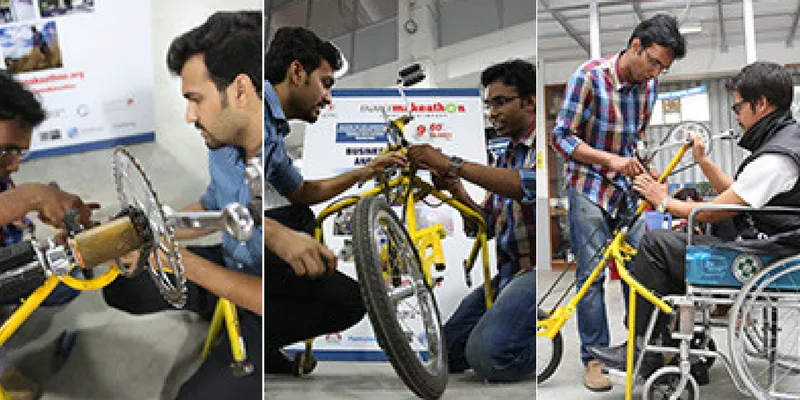
The attachment is available in both manual (hand cycle) and motorised mode to meet the needs of users.
Known as ‘Team Aseem’, the three founders of NeoMotion hope to launch their product in the market for commercial use in 2018. Their venture was incubated by International Committee of the RedCross’s Enable Makethon, 2016.
2. Empowering cerebral palsy
Mobility India, a Bangalore-based organisation, founded by Riyaz H, Soikat Ghosh Moulic, Trivikram, Indra Sena Reddy and Shiva Kumar have designed a low-cost, prefabricated twin device to help correct the posture for children with cerebral palsy.
With adjustable features the product too grows with the child’s age.
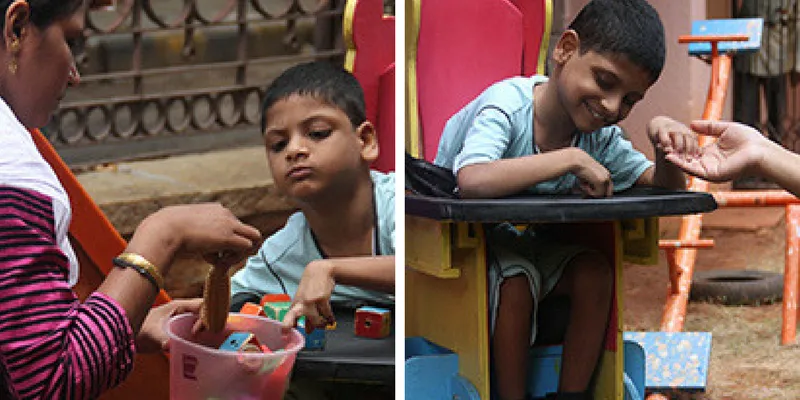
The USP of the device is that the same product can be used as a sitting chair and as a standing frame. Further, priced approximately Rs 5,000, these products also require little space. Mobility India was also incubated by International Committee of the RedCross’s Enable Makethon, 2016.
3. Assistive cars
Anand Kutre, a 41-year-old entrepreneur from Bengaluru, is on a mission to make cars accessible for persons with disabilities. He has designed and built a mechanism that can be easily installed under a car’s driving seat, making it disabled-friendly. Turn Plus seats are designed to make car travel easy for a disabled person, using an easily installable swivel seat mechanism.
“The original seat, along with its track and reclining motion, remains intact. The seat is removed, the mechanism is installed, and the seat is put back. So, there is no modification made in the car’s structure or core functioning, except that it now becomes disabled-friendly,” Anand explains.
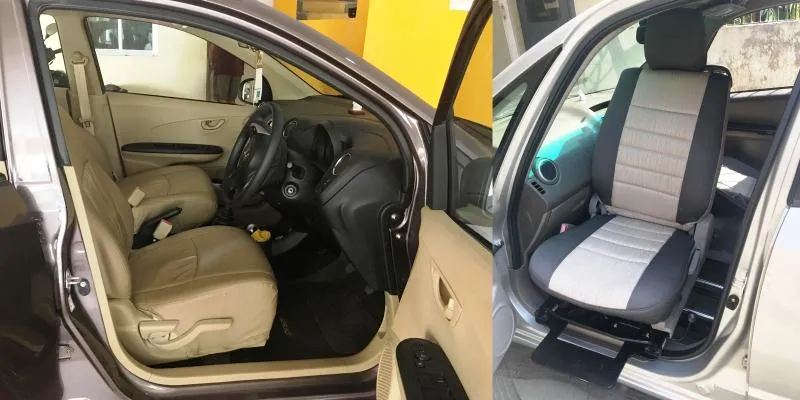
The mechanism does not require electricity or batteries, as it runs completely on manual operation. The product is available at the low cost of Rs 25,000–30,000.
4. Mobile app for the deaf
Quadio Devices Pvt Ltd, a hearing care provider of India, launched a hearing app that replicates as a mobile-based hearing solution complete with all the features of a conventional hearing tool. The Q+ app, a free application, is accessible, controllable, and customisable.
The Q+ app harnesses the processing power of a smartphone to enable it to be used as a complete and fully-functional hearing machine. It is designed to maximise the listening experience based on the results of a simple interactive hearing test. The app also gives the user an ability to control and customise sound quality by intelligently enhancing hearing sounds and speech.
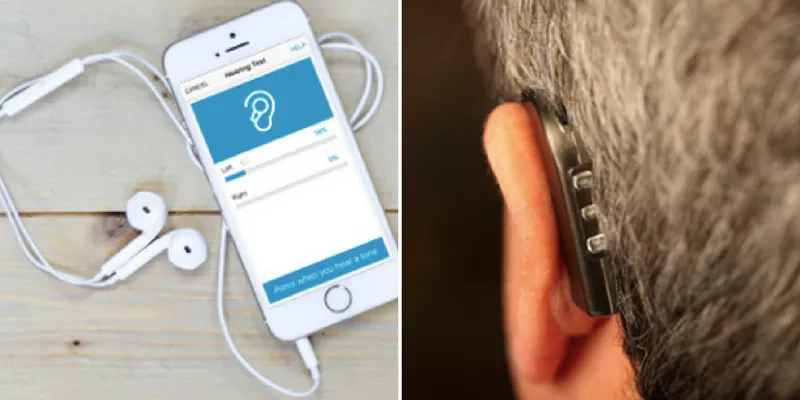
With the Q+ app, a person suffering from hearing disability can easily follow conversations using the phone headset in both quiet and noisy environments, and control the sound quality to customise it to his/her preference.
5. Encyclopaedia for the hearing impaired
Mumbai-based Bleetech has devised a low-cost version of an encyclopaedia for persons who are hearing impaired.
Here, the users can ask questions through a mobile app (either in sign language or English), where they receive answers to their queries in Indian sign language.

Founded by Jahnavi Joshi, Nupura Kirloskar, Akhil Kumar Wachhani, and Snehal Vichare, BleeTech’s first innovation is Blee Watch, a smart watch especially designed for the needs of the deaf people.
6. Accessible videos
Recognising the dire need for assistance in video translations, Chabla Oy, have developed a mobile app service that instantly connects the user to a live interpreter.
Further, it also enables deaf people to make and receive calls. Moreover, the app provides free call service between Chabla users.
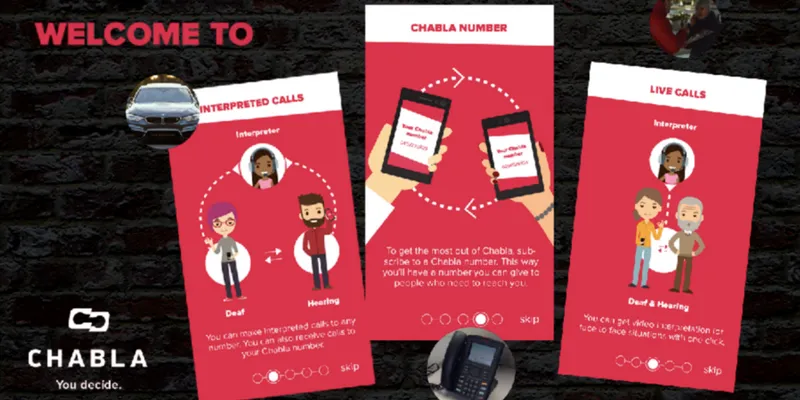
This technological assistive mobile application is being incubated by International Committee of the RedCross’s Enable Makethon, 2017.
7. Real-time text to braille converter
Students from Indian Institute of Space Science and Technology, Thiruvananthapuram, have devised a letter-to-letter braille converter that prints the recognised letter in the braille cell.
The product consists of a small cuboid which can be held with three fingers (thumb, index, and middle) and get placed on a printed text. The user has to slide the cuboid on the text to read it.

Led by Koduri Venkata Naga Gopivikram, the team hopes that through this device, any ordinary hard copy of a book or newspaper can be instantly read by the person. The device usage can also be expanded and enhanced based on user needs and employability. The team is currently being incubated by the Accenture Innovation Challenge.
8. Brain-controlled mobile application
Students from NBN Sinhgad School of Engineering, Pune, have developed a multipurpose Brain Computer Interface that can control mobile applications through brain. Explaining the idea behind this innovation Seemant Singh, the team lead, says
“Specially-abled people are incapable of using technology as others do, because recent technologies such as mobile phones are supposed to be used with our fingers. An individual who has lost his hand due to some reason might not be able to use the technology to fulfil his/her needs.”
The device works on an electroencephalogram using electrodes for reading brain waves. This team, too, is being incubated by the Accenture Innovation Challenge.
9. Gaming for the specially abled
In a first, students from the United Kingdom have developed a software, Gameable, which enables the specially-abled people to play video games. It has an in-built gesture-recognition-based control software.
In 2003, Microsoft Corporation-commissioned Forrester Research, Inc. determined that 57 percent of computer gaming users are very likely to benefit from the use of accessible technology. This technological assistive mobile application is being incubated by International Committee of the RedCross’s Enable Makethon, 2017.







